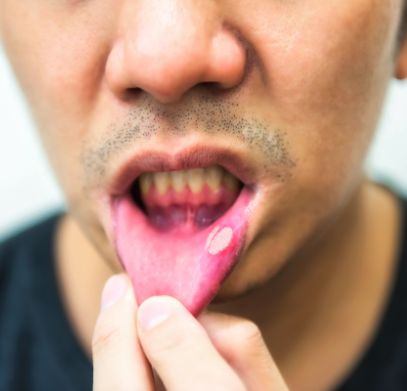10:00 AM to 8:30 PM (Mon - Sat)
10:00 AM to 2:00 PM (Sunday)
Mouth Ulcer Treatment in Vijayawada
Mouth Ulcer Treatment
Do you have a mouth Ulcer? Although mouth ulcers aren't contagious and usually go away on their own, there are treatments available to lessen their painful effects. Get the mouth ulcer treatment in Vijayawada at Lotus Dental Care.

What is a mouth ulcer?
A mouth ulcer is a sore that appears on the inner cheeks, tongue, gums, lips, or palate's soft tissue lining. They can be very painful and are typically yellow or red. Aphthous ulcers and canker sores are other names for mouth ulcers.
What is the difference between mouth ulcers and cold sores?
Inside your mouth, mouth ulcers develop. They're brought on by irritation, harm, vitamin deficiencies, or other things. In contrast, cold sores that develop on your lips are brought on by a virus. Cold sores can spread quickly, but mouth ulcers don't.
Who do mouth ulcers affect?
People of all ages can get mouth ulcers. A mouth ulcer is typically more of an annoyance than a severe medical concern. Although mouth ulcers by themselves are not harmful, they have been associated with a number of significant medical disorders, including:
- Diabetes.
- Immune disorders.
- Inflammatory bowel disease.
- Celiac disease.
- Behcet’s disease.
- HIV and AIDS
How common are mouth ulcers?
Mouth ulcers are one of the most common lesions affecting the mouth. Approximately 20% of people will develop a mouth ulcer at some point.
What are the symptoms of a mouth ulcer?
Mouth ulcers are simple to identify. On your lips, gums, tongue, inner cheeks, or roof of the mouth, they typically manifest as sores. Mouth ulcers often have a white, yellow, or grey centre and are red around the edges. You might only get one ulcer, or you might get several. Other signs could include an increase in pain when cleaning your teeth, swelling around the ulcer, and pain that gets worse when you eat spicy, salty, or sour foods.
How are mouth ulcers treated?
Despite the fact that the majority of mouth ulcers heal on their own, topical medications may be administered to reduce pain and the likelihood of complications. Antiseptic gels, steroid ointments, or medicated mouth rinses are common mouth ulcer treatments. Your doctor might recommend immunosuppressants if the situation is serious.
How can I prevent mouth ulcers?
While mouth ulcers cannot be completely avoided, there are steps you may take to lower your risk. For instance:
For the best oral health,
- brush your teeth twice a day and floss once a day.
- To prevent tissue sensitivity, use a toothbrush with soft bristles.
- Consume a diet full of fresh fruits and vegetables to stay healthy.
- Make routine checkups and cleanings at the dentist.
- Managing your illness might lower the risk of mouth ulcers reoccurring if your doctor determines that your sores are related to an underlying medical condition.


